ADDICTION
ALCOHOL DEPENDENCE
QUIT SMOKING
ALLERGY
ANTI FUNGAL
FUNGAL INFECTION
FUNGAL NAIL INFECTIONS
ANTI-REJECTION DRUGS
ANTI WORM
ANTIBIOTIC
BACTERIAL INFECTIONS
ARTHRITIS
GOUT
OSTEOARTHRITIS
RHEUMATOID ARTHRITIS
BLOOD
LOW PLATELET COUNT
THROMBOPHLEBITIS
VARICOSE VEINS
COLON
ANAL FISSURE
PILES
ULCERATIVE COLITIS
DIABETES CARE
DIABETES INSIPIDUS
DIABETES TYPE
DIABETIC FOOT ULCERS
GLUCOSE MONITOR
EYES/EAR CARE
DRY EYES
EYE CARE
EYE EXAMINATION
EYE INFECTION
EYE LASHES
EYE PAIN
GLAUCOMA
OCULAR HYPERTENSION
UVEITIS
FEVER CARE
MALARIA
RHEUMATIC FEVER
TYPHOID FEVER
GASTROINTESTINAL
ACIDITY
CONSTIPATION
CROHN'S DISEASE
DIARRHOEA
GALLBLADDER STONES
INTESTINAL ULCERS
IRRITABLE BOWEL SYNDROME
MOTION SICKNESS
NAUSEA
Amaryl 1 mg (Glimepiride)
| Active Ingredient (Generic Name): | Glimepiride |
|---|---|
| Indication: | Type 2 diabetes |
| Manufacturer: | Sanofi India Limited |
| Packaging: | 30 tablets in one strip |
| Strength: | 1 mg |
From: $28.00
If you’re managing type 2 diabetes, you might have come across Amaryl 1 mg (Glimepiride). This medication plays a vital role in regulating blood sugar levels, but have you ever wondered about its mechanism of action and potential side effects? Understanding how this drug interacts with your body can provide valuable insights into how to best manage your condition effectively. So, let’s explore the intricate details of Amaryl 1 mg and how it can impact your diabetes management journey.
Why is this medication prescribed?
If you have type 2 diabetes, Amaryl 1 mg (Glimepiride) is prescribed to help lower your blood sugar levels. Glimepiride belongs to a class of drugs known as sulfonylureas, which work by stimulating the pancreas to produce more insulin.
Insulin is a hormone that helps regulate blood sugar levels by allowing cells to take in glucose from the bloodstream to use as energy. By increasing insulin production, Amaryl helps lower blood sugar levels, thereby reducing the risk of complications associated with high blood sugar, such as kidney problems, nerve damage, and vision issues.
It’s important to follow your healthcare provider’s instructions carefully when taking Amaryl to ensure maximum effectiveness. Remember to monitor your blood sugar levels regularly and report any significant changes or concerns to your healthcare provider.
Amaryl should be used as part of a holistic treatment plan that includes a healthy diet, regular exercise, and weight management to effectively manage type 2 diabetes and improve overall health.
How should this medicine be used?
To use Amaryl 1 mg (Glimepiride) effectively, follow the dosage instructions provided by your healthcare provider. Typically, this medication is taken once a day with breakfast or the first main meal of the day.
It’s important to take Amaryl exactly as prescribed by your doctor to achieve the best results. Swallow the tablet whole with a glass of water. Don’t crush, chew, or break the tablet before taking it.
If you forget to take a dose, take it as soon as you remember, unless it’s almost time for your next dose. In that case, skip the missed dose and continue with your regular dosing schedule. Never take a double dose to make up for the missed one.
It’s essential to monitor your blood sugar levels regularly while using Amaryl to ensure it’s effectively managing your condition. If you have any questions or concerns about how to use this medication, consult your healthcare provider for guidance.
Other uses for this medicine
Other potential applications for Amaryl 1 mg (Glimepiride) include managing certain types of diabetes-related nerve pain. This medication may help alleviate the discomfort associated with nerve damage caused by diabetes, known as diabetic neuropathy. Glimepiride, the active ingredient in Amaryl 1 mg, works by stimulating the release of insulin from the pancreas, which can help regulate blood sugar levels and potentially reduce nerve pain over time.
Additionally, Amaryl 1 mg may be used off-label in some cases to treat polycystic ovary syndrome (PCOS). PCOS is a hormonal disorder that can lead to insulin resistance, resulting in high blood sugar levels. By improving insulin sensitivity, Glimepiride may assist in managing the symptoms of PCOS, such as irregular periods and infertility.
It’s important to consult with your healthcare provider before using Amaryl 1 mg for any off-label purposes to make sure it’s safe and appropriate for your specific condition. Your doctor can provide guidance on the potential benefits and risks associated with using this medication for alternative uses.
What special precautions should I follow?
When taking Amaryl 1 mg (Glimepiride), it’s important to regularly check your blood sugar levels as directed by your healthcare provider. This will help you monitor the effectiveness of the medication and make certain that your blood sugar levels are within the target range.
Remember to follow any specific instructions given to you by your doctor regarding monitoring your blood sugar levels while taking Amaryl 1 mg.
Check Blood Sugar Levels
Regularly monitor your blood sugar levels as directed by your healthcare provider to guarantee effective management of your condition. To guarantee accurate readings and proper interpretation, follow these steps:
- Use a reliable blood glucose monitoring device recommended by your healthcare provider.
- Wash your hands before testing to prevent contamination of the blood sample.
- Record your blood sugar levels at consistent times each day to track patterns.
- Take note of any symptoms or factors that may affect your blood sugar levels, such as exercise, illness, or stress.
What special dietary instructions should I follow?
To optimize the effectiveness of Amaryl 1 mg (Glimepiride), it’s essential to adhere to specific dietary guidelines. Maintaining a balanced diet plays an important role in managing blood sugar levels while taking Amaryl. It’s recommended to focus on consuming a variety of nutrient-dense foods such as fruits, vegetables, whole grains, lean proteins, and healthy fats. Limiting the intake of sugary foods and beverages can help prevent spikes in blood sugar levels that may counteract the medication’s effects.
Additionally, it’s important to monitor carbohydrate intake as they directly impact blood sugar levels. Distributing carbohydrates evenly throughout the day and avoiding excessive consumption in one sitting can assist in better glucose control. It’s advisable to consult with a healthcare provider or a registered dietitian to create a personalized meal plan that aligns with your specific dietary needs and Amaryl therapy. By following these dietary instructions, you can enhance the effectiveness of Amaryl and better manage your diabetes.
What should I do if I forget a dose?
If you happen to miss a dose of Amaryl 1 mg (Glimepiride), take it as soon as you remember, unless it’s close to the time for your next scheduled dose. If it’s near the next dose time, skip the missed dose and continue with your regular dosing schedule. Don’t double up on doses to make up for the missed one. It’s important to maintain a consistent medication routine to control your blood sugar levels effectively.
In case you’re unsure about what to do if you forget a dose or have questions concerning your medication schedule, it’s advisable to consult your healthcare provider or pharmacist for guidance. They can provide you with personalized advice based on your specific situation.
Remember that adherence to your prescribed dosing regimen is crucial for the best effectiveness of Amaryl in managing your diabetes. By following your healthcare provider’s instructions closely, you can help ensure the best outcomes from your treatment.
What side effects can this medication cause?
Amaryl 1 mg (Glimepiride) can cause various side effects that may require monitoring. Some of these side effects can be serious, so it’s crucial to pay attention to any persistent or worsening symptoms.
If you notice any concerning symptoms, such as severe dizziness, unusual tiredness, or signs of low blood sugar, contact your doctor promptly for guidance and evaluation.
Monitor Persistent or Worsening Symptoms
Common side effects of Amaryl 1 mg (Glimepiride) may include dizziness, nausea, and headache. It’s important to monitor any persistent or worsening symptoms while taking this medication to guarantee your well-being. Here are some common signs to watch out for:
-
Persistent dizziness: If you experience ongoing episodes of dizziness that affect your daily activities, it’s essential to notify your healthcare provider.
-
Worsening nausea: If the feeling of nausea intensifies over time or becomes unbearable, consulting your doctor is advisable.
-
Increasing headaches: Continuous or severe headaches should be brought to the attention of your healthcare provider promptly.
-
Unexplained fatigue: If you’re feeling excessively tired without a clear reason, discussing this with your doctor is recommended.
Some side effects can be serious. If you experience any of the following symptoms, call your doctor immediately:
When taking Amaryl 1 mg (Glimepiride), it’s important to be aware that some side effects can be serious, requiring immediate medical attention. If you experience any of the following symptoms, call your doctor immediately:
-
Severe allergic reactions such as rash, itching, swelling, severe dizziness, or trouble breathing.
-
Signs of low blood sugar like sudden sweating, shaking, fast heartbeat, hunger, blurred vision, dizziness, or tingling hands/feet.
-
Symptoms of high blood sugar including increased thirst/urination, confusion, drowsiness, flushing, rapid breathing, or fruity breath odor.
-
Unusual fatigue, persistent nausea/vomiting, stomach/abdominal pain, dark urine, or yellowing eyes/skin, which could indicate liver problems.
What should I know about the storage and disposal of this medication?
To guarantee the effectiveness and safety of your medication, proper storage and disposal of Glimepiride are essential. Store your Glimepiride tablets at room temperature away from moisture and heat. Keep the medication in its original container with the lid tightly closed. Make sure to keep it out of reach of children and pets. Don’t store Glimepiride in the bathroom or near the kitchen sink.
When it comes to disposing of Glimepiride, don’t flush it down the toilet or pour it into a drain unless instructed to do so. Properly discard any medication that’s expired or no longer needed. You can check with your pharmacist or local waste disposal company for guidance on how to safely dispose of Glimepiride. It’s important to follow these guidelines to prevent any accidental ingestion or misuse of the medication. If you have any questions regarding the storage or disposal of Glimepiride, consult your healthcare provider for further information.
In case of an emergency/overdose
In the event of an emergency or overdose with Glimepiride, contact poison control or seek immediate medical attention. If you suspect an overdose, it’s important to act promptly to prevent any potential serious complications. Symptoms of an overdose may include confusion, extreme weakness, blurred vision, seizures, or unconsciousness. When reaching out to medical professionals, be prepared to provide information such as the amount of medication ingested, the time of ingestion, and any symptoms experienced. It’s significant not to attempt home remedies or induce vomiting unless specifically instructed by healthcare providers or poison control experts.
Emergency medical treatment for Glimepiride overdose may involve measures to remove the medication from the body, support vital functions, and manage any symptoms or complications that arise. It’s essential to follow the guidance of healthcare professionals closely in these situations. Additionally, inform medical staff about any other medications or substances you have taken, as interactions can impact treatment decisions. Remember, prompt action in cases of overdose can help ensure the best possible outcome.
What other information should I know?
For in-depth understanding, familiarize yourself with potential side effects and necessary precautions when taking Amaryl 1 mg (Glimepiride). It’s important to be aware of common side effects such as dizziness, nausea, and headache. If these symptoms persist or worsen, inform your healthcare provider promptly. Additionally, monitor your blood sugar levels regularly as directed by your doctor to make sure Amaryl is effectively managing your condition.
Precautions to take while using Amaryl include avoiding excessive alcohol consumption, as it can lower your blood sugar levels dangerously. Inform medical professionals about all the medications you’re currently taking to prevent potential interactions that could impact Amaryl’s effectiveness. Be cautious when engaging in activities that require alertness, such as driving or operating machinery, as Amaryl can cause drowsiness. It’s vital to follow your healthcare provider’s instructions closely and attend scheduled check-ups to monitor your progress and address any concerns promptly. By staying informed and proactive, you can manage your diabetes effectively while taking Amaryl.
Brand names
You can find Amaryl 1 mg (Glimepiride) sold under the brand names Amaryl and Glucotrol. These brand names are commonly used to refer to the medication containing Glimepiride, a type of oral diabetes medicine that helps control blood sugar levels. Below is a table showcasing some key information about these brand names:
| Brand Name | Description |
|---|---|
| Amaryl | Original brand name for Glimepiride |
| Glucotrol | Another brand name for Glimepiride |
Both Amaryl and Glucotrol contain the active ingredient Glimepiride, which works by stimulating the release of insulin from the pancreas to lower blood sugar levels. While they are different brand names, they serve the same purpose in managing diabetes. It’s important to follow your healthcare provider’s instructions regarding the brand name prescribed to you and to inform them of any concerns or side effects you may experience.
Purchase Options for Amaryl
Considering different options for acquiring Amaryl can help you manage your diabetes effectively. Amaryl, containing the active ingredient Glimepiride, is commonly available for purchase both online and in physical pharmacies. When buying Amaryl, you have the choice of purchasing the brand-name version or opting for the generic alternative, which may be more cost-effective.
One option is buying Amaryl from your local brick-and-mortar pharmacy. This allows you to speak with a pharmacist directly and ask any questions you may have about the medication. Another option is utilizing online pharmacies, which offer convenience and the possibility of discounted prices. However, make sure that the online pharmacy is reputable and operates within legal guidelines to avoid counterfeit or substandard medications.
Additionally, some insurance plans may cover a portion of the cost of Amaryl, making it more affordable for you. It’s important to compare prices between different purchasing options to find the most cost-effective solution while ensuring you receive a genuine and effective medication to manage your diabetes efficiently.
To summarise
When exploring purchasing options for Amaryl, it’s important to take into account cost-effectiveness and authenticity in order to effectively manage your diabetes.
Cost-effectiveness plays a significant role in ensuring that you can afford your medication in the long term without compromising on quality. By comparing prices at different pharmacies or considering generic alternatives, you can make a more informed decision that suits your budget.
Additionally, ensuring the authenticity of the medication is essential for your health and safety. Purchasing from reputable sources, such as licensed pharmacies or verified online vendors, helps reduce the risk of receiving counterfeit or substandard products.


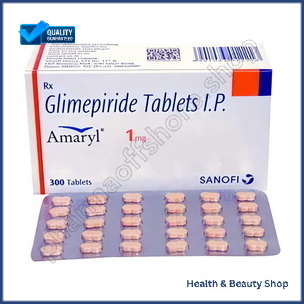
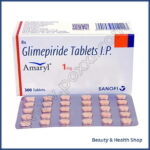

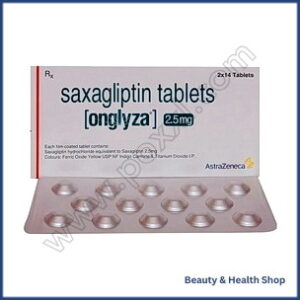

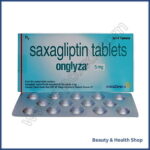
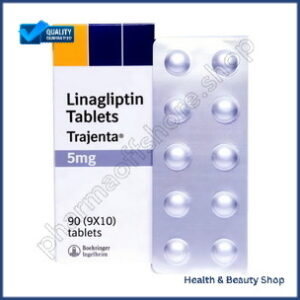

There are no reviews yet.